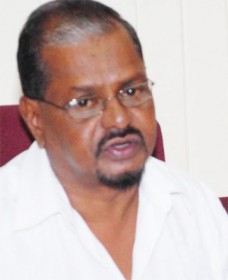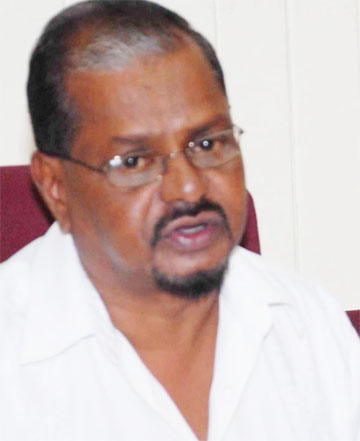-propose that ways be explored to curb ministerial discretion
The major international donors have urged an integrated approach to implementation of legislative reforms for local government, while recommending that the legislature explore ways to curb ministerial discretion over local authorities.
In a joint letter to Local Government Minister Kellawan Lall, who chairs the special select committee reviewing the reforms for implementation, the representatives of the US, the UK, Canada and the EU Delegation say the proposed local government changes represent a milestone in the reform process. The letter, dated July 14, 2009, which has been seen by Stabroek News, is intended to share their collective views of what steps parliament and the government might consider, to ensure that the reform spirit reflected in the proposed legislation would be sustained and the various measures would be implemented.

The select committee is currently reviewing the Local Authorities (Elections) (Amendment) Bill 2009, the Fiscal Transfers Bill 2009, the Local Government Commis-sion Bill 2009, the Local Government (Amendment) Bill 2009 and the Municipal and District Councils (Amendment) Bill 2009, all considered crucial to revamping the local government system. Ironing out the proposed legislation had previously been the mandate of the Joint Task Force on Local Government Reform, which had been working for eight years before it was abandoned in favour of the parliamentary review, which government hopes would see the holding of polls this year.
The Guyana Elections Commission (GECOM) has been working towards a November 30, 2009 deadline for running off the local government elections, which have been due since 1997.
The letter notes the engagement of the donors in building local government capacity in the past and their encouragement for the enactment of legislation to strengthen local government in Guyana. “The measures before the select committee represent an important milestone in the reform process,” they said, noting that the proposed laws provide for a legal and institutional framework that improves the possibility of more democratic, accountable and effective local governance in the future. They added, “We realize, as we are sure all parliamentarians do, that much work remains to make that possibility a reality.”
The donors commended the government for presenting the reforms as a package to the National Assembly, noting that the Joint Task Force had understood the importance of an “integrated approach” to reform. In this vein, it was noted that the three principal bills–the Local Authorities (Elections) (Amendment) Bill 2009, the Local Government Commission Bill 2009 and the Fiscal Transfers Bill 2009–are “interdependent” and “mutually reinforcing.” As a result, the donors argued that it is “important” that they “proceed together” through the process of parliamentary debate, passage and implementation.
Referring to the Fiscal Transfers Bill and the Local Government Commission Bill, the donors noted that they would be strengthened with “more precision” in setting timelines for the development and implementation of the formula for fiscal transfers, and for the operationalization of the Commission. “These measures are designed to increase fiscal capacity, strengthen local authority, and promote greater accountability,” they pointed out, adding, “These are reforms that cannot wait.”
‘Decentralizing
power’
The donors also drew attention to the fact that a consistent theme throughout the legislative proposals and the accompanying notes of the Minister is the principle of the devolution of power. Indeed, they cited the “significant transfer of ministerial discretion” in a number of areas from the Minister to the Local Government Commission, noting that this is intended to meet the obligations set out under Article 78 (a) of the Constitution.
Further, for the Commis-sion to succeed, they argued, it must be seen to act impartially, competently and effectively. As a result, in addition to the need for a time frame for its implementation, they recommended that Parliament look at the composition of the commission and the appointment process to ensure it is inclusive and is seen to be able to act independently in accordance with its mandate under statute. They also urged the Parliament to seek assurances that the resources available to the Commission would be commensurate with its heavy responsibilities.
The bill for the local government commission has raised eyebrows as it proposes that the Commission have six members; three to be appointed by the President, in accordance with his own deliberate judgement; two to be appointed by the President after he has consulted with the Opposition Leader; and one other member appointed by the Local Government Minister after he has consulted with local democratic organs. This formula is unlikely to please the opposition as it would give the government a complete lock on all matters before the local government commission.
One clear criticism in the letter was that the legislation retains much of the discretionary powers available to the Minister, which the donors note has been the subject of considerable debate and a continuing concern of local councils, particularly at the municipal level. “We appreciate that devolution of power is a process that will proceed as confidence in local capacity increases, but Parliament may want to look at how it can facilitate that transition,” they observed. To this end, they suggested that the regulations for the legislation could set out transparent criteria for the exercise of ministerial discretion and that he legislation itself could describe the ministerial powers as exceptional rather than routine. This is clearly not the case, the donors said, citing as an example the proposed amendment to the Municipal and District Councils Bill, which they argue sets out onerous responsibilities on councils justify to the Minister a decision to alter fees or opening and closing hours of facilities. “Entrenching this process in the statute rather than dealing with it through the regulatory process is likely to impede rather than promote empowerment of local authorities over time,” they explained.
‘Sustaining the
reforms’
Meanwhile, the donors anticipated that Parliament would be concerned to ensure that the reforms are sustainable, particularly in light of the long tradition of local government in Guyana and its potential to stimulate economic development. As a result, they suggested that the national Assembly consider creating a Standing Commit-tee for local government to facilitate continuing dialogue on its future, following the implementation of enacted reforms and provide oversight of the Local Government Commission.
Also, bearing in mind that the legislation the National Assembly adopts would see significant changes to how local authorities are elected and how they operate, the donors also highlighted the import of ensuring voters are fully informed of the new arrangements. According to them, ensuring voters are fully informed about the new electoral process would be critical to the success of the reforms. “We believe that an adequate amount of time needs to be allocated, in advance of local government elections, to allow that to happen,” they said.
The enactment of the Local Authorities (Elections) (Amendment) Bill would put in place an electoral system that mixes equally proportional representation and first past the post as the new legal framework for the holding of local government polls. It would also see local authority areas divided into constituencies to elect members of the municipalities and neighbourhood democratic councils-a task that the Guyana Elections Commission (GECOM) is making preparations to carry out. Under the law, GECOM would be empowered to combine or subdivide one or more electoral divisions to form a constituency for the purpose of electing members of that local authority.
The Fiscal Transfers Bill meanwhile seeks to give effect to the constitutional requirement for the formulation and implementation of objective criteria for the purpose of the allocation of resources to local democratic organs. The Bill sets out that the formula for fiscal transfers shall be based on “a set of conditions and stipulated performance indicators,” prescribed by regulations made by the Local Government Minister.

